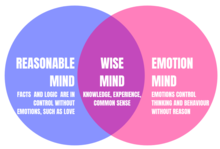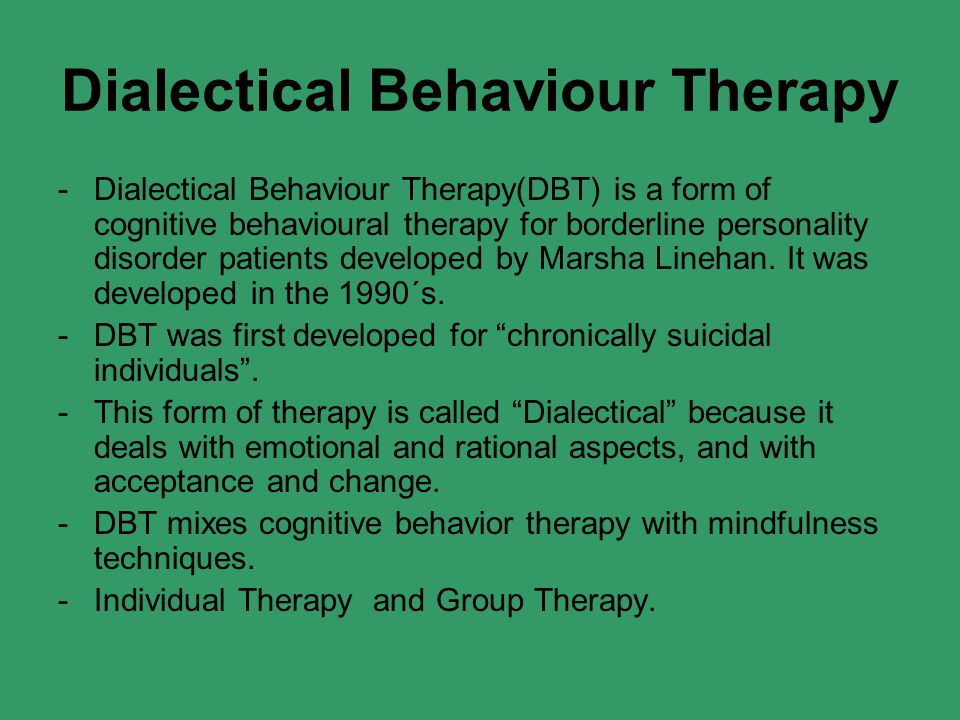Changing Lives: DBT London's Holistic Technique to Recovery
Changing Lives: DBT London's Holistic Technique to Recovery
Blog Article
Encouraging Individuals Through Reliable Dialectical Behaviour Therapy (DBT) Solutions: Structure Stronger Mental Health Foundations
In the world of mental health and health, the value of empowering people with efficient Dialectical Behaviour Treatment (DBT) solutions can not be overstated. By focusing on the core concepts of DBT, such as improving emotional regulation abilities, improving interpersonal performance, developing distress resistance strategies, and cultivating mindfulness methods, individuals can begin on a journey in the direction of building more powerful mental health structures.
Understanding the Core Concepts of DBT
-p-800.png)

One core principle of DBT is recognition. Therapists making use of DBT acknowledge the person's feelings and actions as valid feedbacks to their atmosphere. This recognition helps develop a solid restorative partnership and encourages individuals to work in the direction of adjustment. Another essential facet is dialectics, which instructs people to view situations from several perspectives and discover the synthesis in between conflicting thoughts or emotions.
Moreover, the concept of dialectical abstinence is central to DBT. This concept motivates people to avoid self-destructive behaviors while likewise accepting themselves. By comprehending and including these core concepts, specialists can effectively execute DBT methods and support individuals in their journey in the direction of psychological law and psychological health.
Enhancing Psychological Regulation Abilities
Developing proficiency in taking care of emotions is an essential element of cultivating emotional health and social performance - DBT London. Enhancing psychological regulation abilities is a core component of Dialectical Practices Treatment (DBT) that outfits people with the devices to browse intense emotions in a positive and healthy and balanced fashion. With DBT, individuals discover to identify, understand, and regulate their emotions, leading to improved psychological wellness results
DBT stresses the importance of mindfulness, which entails existing in the minute without judgment. This method allows people to observe their feelings without becoming overwhelmed by them, boosting their capability to respond successfully instead than react impulsively. By cultivating mindfulness, people can establish a greater feeling of self-awareness and emotional control.
In addition, DBT educates sensible skills such as distress tolerance and feeling regulation techniques to aid individuals take care of difficult emotions. By learning these abilities, people can reduce spontaneous behavior, boost decision-making, and enhance their connections with others. Ultimately, boosting emotional law skills via DBT empowers people to lead more meeting and balanced lives.

Improving Interpersonal Performance
Having actually established a solid foundation in psychological policy abilities within the structure of Dialectical Practices Treatment (DBT), the emphasis currently moves in the direction of enhancing social effectiveness. Improving interpersonal effectiveness is a critical component of DBT as it equips people with the needed skills to navigate social interactions, communicate effectively, set borders, and develop healthier connections.
In DBT, interpersonal efficiency skills are taught through components that concentrate on locations such as assertiveness, effective interaction, and social analytical. By learning these skills, people site can improve their capability to express their wishes and requirements, maintain self-regard, and develop stronger links with others.
Exercising mindfulness is an important part of improving social effectiveness within the DBT structure. Mindfulness allows people to be present in their communications, listen proactively, and respond attentively instead of respond impulsively. By incorporating mindfulness right into their daily lives, people can cultivate higher self-awareness and emotional guideline, which are crucial for successful interpersonal interactions.
Structure Distress Tolerance Strategies
Exploring reliable methods for managing emotional distress is essential for individuals looking for to enhance their coping skills and resilience. Building distress resistance methods is a crucial aspect of Dialectical Behaviour Treatment (DBT) that empowers individuals to browse tough emotions without ending up being overloaded - DBT London. One fundamental method in DBT for distress resistance is the acronym "ACCEPTS," which means Tasks, Adding, Comparisons, Feelings, Pushing away, Thoughts, and Experiences. By utilizing these methods, people can effectively cope with stressful scenarios and regulate their emotional actions.
Furthermore, mindfulness practices play a considerable function in building distress tolerance. Mindfulness encourages individuals to stay present in the moment without judgment, allowing them to observe their ideas and feelings without reacting impulsively. This understanding allows individuals to tolerate distress better and develop a higher feeling of control over their reactions.
In enhancement to these methods, creating a customized distress tolerance strategy with the guidance of a trained specialist can give people with a tailored approach to handling psychological distress - DBT London. By including these methods into every day life, people can enhance their psychological health structures and improve their overall health

Cultivating Mindfulness Practices
To grow their distress tolerance strategies further, individuals can concentrate on growing mindfulness methods as a he has a good point corresponding method within the structure of Dialectical Practices Treatment (DBT) Mindfulness, a key component of DBT, includes taking note of the here and now moment without judgment. By promoting mindfulness, individuals can improve their recognition of ideas, feelings, and physical feelings, advertising a much deeper understanding of themselves and their experiences.
Mindfulness techniques in DBT consist of strategies such as conscious breathing, body scans, and observing ideas without attachment. These practices encourage individuals to develop a non-reactive stance in the direction of their internal experiences, allowing them to react to tough situations with better quality and calmness. By including mindfulness into everyday routines, individuals can learn to regulate their emotions extra efficiently, minimize spontaneous habits, and cultivate a sense of internal peace.
With cultivating mindfulness practices, individuals undertaking DBT can construct a solid foundation for look at here managing tension, enhancing relationships, and enhancing total wellness. By integrating mindfulness into their healing journey, individuals can create beneficial abilities that equip them to navigate life's obstacles with strength and self-awareness.
Final Thought
In conclusion, effective Dialectical Practices Therapy (DBT) services play an important function in empowering individuals to construct stronger mental wellness foundations. By understanding the core concepts of DBT, enhancing psychological law skills, boosting social effectiveness, constructing distress resistance methods, and cultivating mindfulness techniques, individuals are geared up with the essential tools to browse their emotions, relationships, and obstacles in a much more durable and flexible way. DBT solutions supply a detailed approach to advertising psychological wellness and encouraging individuals to lead meeting lives.
By focusing on the core concepts of DBT, such as enhancing psychological law abilities, improving interpersonal effectiveness, developing distress tolerance methods, and growing mindfulness practices, people can embark on a trip in the direction of building more powerful psychological health structures. Enhancing emotional law skills is a core element of Dialectical Practices Treatment (DBT) that gears up individuals with the tools to browse extreme feelings in a useful and healthy way.In addition, DBT teaches useful abilities such as distress resistance and feeling law strategies to help people take care of challenging emotions.To deepen their distress tolerance methods better, people can focus on cultivating mindfulness practices as a complementary technique within the structure of Dialectical Practices Therapy (DBT) By recognizing the core principles of DBT, improving psychological guideline abilities, enhancing social effectiveness, building distress tolerance techniques, and growing mindfulness techniques, people are geared up with the needed devices to browse their feelings, connections, and difficulties in a more adaptive and resilient way.
Report this page